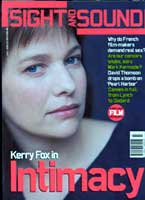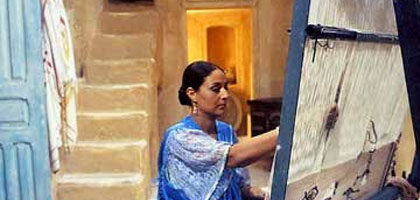
The homecoming
Film of the Month: Saison des hommes, La

Moufida Tlatli's female gaze weaves her characters' memories of an island past into the Tunisian present. By Ilona Halberstadt
Tunisian director Moufida Tlatli's La Saison des hommes starts with the cries of Aziz (Adel Hergal), an autistic child, as his mother Aicha (Rabiaa Ben Abdallah) and her sister-in-law Zeineb (Sabah Bouzouita) struggle to bath him; it ends with the cries of Aicha giving birth to Aziz intercut into the stillness of Aziz, years later, quietly looking out from behind his mother's loom. Aziz, who doesn't talk but responds with his eyes to his sister's violin-playing and whose piercing cries cease as he finally finds a means of expression in weaving, is the mainspring of La Saison des hommes, providing the central irony around which the film is constructed. Aicha's husband Said (Ezzedine Guennoun), in the path of tradition, wants a son but instead he gets a 'problem child' who is healed by assuming the work of women, carpet weaving. Aicha, content with two daughters, struggles to leave the island of Djerba where they live to join her husband in Tunis, where he works, but is allowed to do so only when she bears him a son. Forced later by her husband to choose between him and the child he wanted, she decides to return to Djerba to heal their son.
The opening sequence unfolds in present-day Tunis where Said keeps the keys to the abandoned family house in Djerba wrapped up in the first carpet Aicha wove for him. Said feels he is blamed for everything by his wife and two daughters; for a moment we witness his sense of abandonment, though it was he who moved out of their Tunis home because of his unwillingness to deal with Aziz's problems. From the point that Aicha, after years away, unlocks the house in Djerba and enters into the darkness, the life which she so desired to leave behind comes alive in a series of flashbacks - sparked off by one person's memory, another's dream, a gesture - which link different points of view and behaviour to past experience.
The past and the present, modernity and tradition co-exist in this post-colonial world, where, despite their equality before the law, women's lives are restricted by domestic authority and traditional female roles. But as Nouri Bouzid, a film director and poet credited with the dialogue and adaptation in both this film and Tlatli's debut feature The Silences of the Palace/Les Silences du palais (1994), has commented, 'For [Tlatli], the women's cause... is a doorway to emotion.' Bouzid's dialogue, monologues and lyrics provide momentum by condensing situations and feelings, punctuating the exploration of meaning Tlatli achieves through her concentration on spatial relationships, gestures, looks and what cannot be said.
While the film's metaphors imbue it with a poetic texture, these are embedded in social and economic realities. Said experiences conflicting interests: while he reinforces his mother's authority in the household in Djerba (which represents his power over his wife and daughters), he also encourages Aicha to engage in carpet weaving (against the wishes of his mother who sees it as contrary to the local Djerban tradition). And while the carpet weaving binds Aicha to Said and to his business, it is also a liberating form of self-expression. At one point Aicha says she improvises as she weaves - a departure for her from Djerban practice into the wider space of Maghrebi customs and into the modern economy. Within a traditional household in a changing contemporary world, options are glimpsed; as in The Silences of the Palace, Tlatli shows us the spaces women create for themselves.
Tlatli, a long-time editor who here weaves some 20 years of family history into a coherent whole, showing the texture and patterns of domestic life, says she likes to improvise in her editing. Her nuanced cinematic style evokes the lyrical realism of Satyajit Ray and shares the Tunisian New Wave's frequent placing of children as witnesses to the companionship of women, able to glimpse the emotional and sexual force breaking through traditional boundaries and male authority. Tlatli's inventive use of flashback investigates the way the past is enmeshed in the present and how daughters implicated in their mother's humiliations and resilience confront their own conflicts.
Each scene is structured along the same lines as the movie as a whole. Changes of mood are reflected by changes of rhythm: the preparation for the season of men, the month during which the Djerban husbands who have been working in Tunis return to the island, is as joyous as the ululating at their arrival, and both are ruptured by moments and exchanges of pain. The alternative world the men experience in Tunis is only guessed at, reported, but rarely seen by the women or by us. The silences within the narrative not only denote blockage or absence but also provide the spaces within which the characters explore their feelings and their surroundings. The film allows an understanding of each character in scenes of self-reflection which carry the narrative delicately forward. There is observation but no antipathy towards those portrayed: Said's mother Ommi (Mouna Noureddine), in an abrupt solitary act, cuts the threads of Aicha's loom, tearing at the fabric of the film, in contrast with an iconic moment when she is seen to suffer for her charges but still trusts to God and society's rules. Spontaneity and restriction vie with each other in a continuing dialogue. The camera observes a character in deep focus before approaching slowly to home in on a detail only to turn round abruptly or cut to reveal a new motif. The pace takes its cue from the movement and gestures of the characters.
Tlatli's film, like one of Aicha's beautiful carpets, places its motifs in a spacious background. The interior of the white house in Djerba is enclosed within a wider space which includes the open courtyard. The sea encloses Djerba itself - but gives it large horizons.
